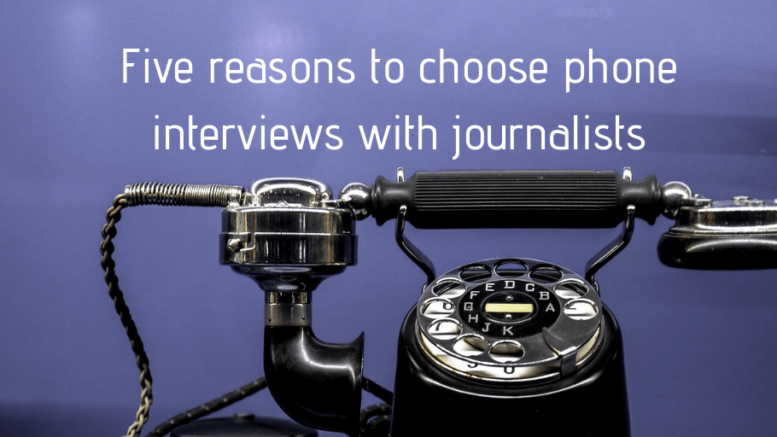It’s easy to understand why spokespeople prefer email instead of phone interviews with reporters. Email responses are well-crafted, can’t be misquoted, and are low pressure. A written statement can be drafted by comms professionals and thoroughly vetted.
But spokespeople should almost always opt for a phone interview with print media when possible. Even better in-person! Here’s why:
1. MORE PERSONAL
Media relationships are easier to build live in a phone call than via email. It’s much faster to establish common ground in an actual conversation. There might be small talk at the beginning, there’s more opportunity for humor and a personal thank-you is more genuine than a corporate email sign-off.
2. BECOME A GO-TO SOURCE
A phoner allows the reporter to take the conversation in unexpected directions. Of course, that can make a spokesperson nervous but as long as basic interview techniques are used, this is a great opportunity to showcase depth of understanding, and to seed future stories. It’s more likely a reporter will see the spokesperson as a source if they cover a range of topics, than if they’re constrained to an email script.
3. AVOID MISUNDERSTANDINGS
You can’t be misquoted via email, but voice communication is far more likely to convey true meaning. We’ve all seen people totally misunderstand a written email. Emphasis and intonation in a call can provide a layer of context to quotes which are missing in a written statement. Plus if it’s clear the reporter hasn’t fully understood your intent, there’s a chance to further explain.
4. GET THE PULL-QUOTE
The very thing which makes phoners more risky is what makes the reward greater. Namely that written quotes, once they have gone through the mill, can be devoid of character. In a phone interview, you are more likely to come up with an apt turn of phrase which is the pull-quote of the entire piece. That’s not to say statements aren’t quotable and can’t be catchy, but verbatim speech hits the mark more often.
5. GOOD PRACTICE
Spokespeople improve with practice, which you don’t get with an email interview. Phoners help prepare spokespeople for other live interviews, including television. If your spokesperson has aspirations for ‘big league’ interviews, a solid grounding of phoners will build confidence. Radio interviews are often via phone or Skype so familiarity makes them less daunting.
EMAIL HAS ITS PLACE
All this said, there are times when an email interview is the best option, such as:
- During a crisis when the facts aren’t clear
- When the topic is highly complex and likely unfamiliar to the reporter
- If the spokesperson has no time, and the alternative is a ‘no comment’
- When the interview involves a legal, or potentially legal matter.
GETTING THE MOST FROM PHONE INTERVIEWS
Phone interviews can be nerve-wracking, so it’s best to prepare. Have a briefing sheet with key messages and likely talking points; read through the reporter’s recent coverage; run through your answers in advance saying them out loud. It’s a good idea to hold the interview standing up so you can gesture and demonstrate more energy. Often the comms team may listen in, but try to avoid having multiple spokespeople on the line. That will impact the flow of the conversation and can be hard for a reporter to get what they need.
With preparation, a phone interview can be a basis for a long-term relationship with a reporter, while building interview technique and getting a better outcome for the company. It’s not applicable in every circumstance, but making this investment will often get better coverage today, and lay foundations for future success.
